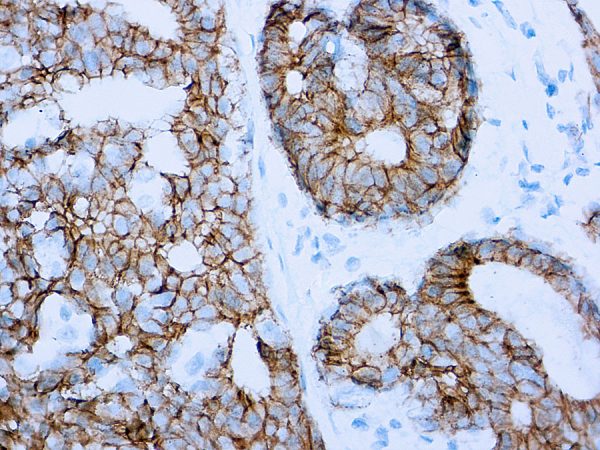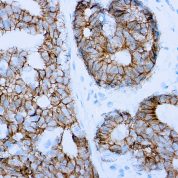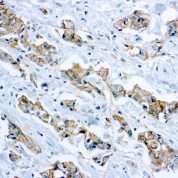Antibody (Suitable for clinical applications)
Sample Type: FFPE Patient Samples.
Tested Applications: IHC. Approved for In Vitro Diagnostic Procedures on FFPE tissues. For tissue collection recommendations, please see datasheet sent with product.
Application Notes
| Specification | Recommendation |
|---|---|
| Recommended Dilution (Conc) | 1:25-1:50 |
| Pretreatment | Citrate Buffer pH 6.0 |
| Incubation Parameters | 30 min at Room Temperature |
Prior to use, inspect vial for the presence of any precipitate or other unusual physical properties. These can indicate that the antibody has degraded and is no longer suitable for patient samples. Please run positive and negative controls simultaneously with all patient samples to account and control for errors in laboratory procedure. Use of methods or materials not recommended by enQuire Bio including change to dilution range and detection system should be routinely validated by the user.
Clonality: Monoclonal
Anti-E-Cadherin Antibody Clone: SPM471
Host and Isotype: Mouse IgG 2b/k
Recommended Positive Control Sample: Breast carcinoma, Colon carcinoma, Appendix
Cellular Localization of Antibody SPM471 Staining: Cell Membrane
Buffer and Stabilizer: PBS with 1% BSA and 0.05% NaN3
Antibody Concentration: Lot specific. Plese contact tech support for data.
Immunogen: Recombinant protein encoding human Cadherin-E 600-707aa
Storage Conditions: This antibody should be stored refrigerated (2-8°C). This product should not be used past the expiration date printed on the vial.
E-Cadherin Information for Pathologists
Summary:
Epithelial calcium-dependent cell adhesion protein. Calcium dependent transmembrane epithelial protein that promotes intercellular adhesion. Its loss is associated with invasive carcinoma. Tumor suppressor gene CDH1 is at 16q22.1. Abnormal function in carcinomas may facilitate cellular detachment leading to metastasis.Common Uses By Pathologists:
Distinguish LCIS from DCIS in indeterminate cases (Am J Surg Pathol 2001;25:229). Marker of immature erythroid precursors (Am J Clin Pathol 2014;141:656). Microscopic (histologic) images Images hosted on other servers:. Missing Image.Limitations and Warranty
This antibody is manufactured in accordance with clinical good manufacturing practices in an ISO13485:2016 certified production facility. It is intended for multiple uses including in vitro diagnostic use and research use only applications. Please see vial label for expiration date. We strive to always deliver antibodies with a shelf life of at least two years.







There are no reviews yet.